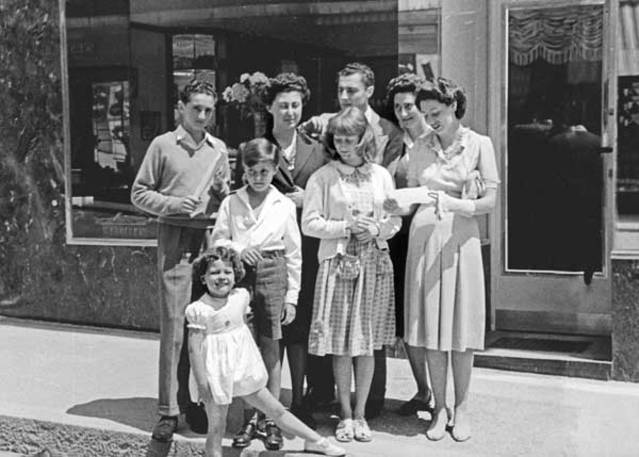


"Addio, Addio, Mio Ultimo Amore..."
This is the title of one of the books written by Susanna Agnelli dedicated to Mount Argentario [2], the splendid archipelago in Tuscany where she served as mayor. Susanna Agnelli chose that natural oasis for her own private funeral service, and her ashes, according to her will, will be scattered in the sea on a stormy day.
Susanna Agnelli, known as Suni, died on May 15 at the age of 87 in a hospital in Rome from complications stemming from a broken hip. The third of seven children, she was a year younger than her brother Giovanni known as Gianni who was the president of Fiat, the automaker their grandfather started in 1899. When she was 13, her father, Edoardo, was killed in a plane crash. Ten years later her world was shattered again when her half-American mother, Virginia Bourbon del Monte, died in a car accident.
Susanna Agnelli recounted her early life marked by tragedy with the loss of both parents in her autobiography Vestivamo alla Marinara (We Always Wore Sailor Suits).
In an ironic and disenchanted voice, she narrates her bittersweet memories of one of the richest families in Italy during the Fascist dictatorship. In this bestseller, there is a gallery of characters who she met early in her life – famous people such as her grandfather and founder of Fiat, Senator Giovanni Agnelli, Gian Galeazzo Ciano, Curzio Malaparte, and her brother Gianni with whom she shared a close and special relationship. There are also ordinary people who made an impression on her life and influenced various aspects of her character. The most important person in this regard was her strict English nanny, Miss Parker, whose constant admonition “Don’t forget that you are an Agnelli” represented the leit motif of her childhood and gave her the awareness that a life full of privilege also required a deep sense of responsibility. Her strong personality led her to be viewed not only as a member of Italy’s powerful Fiat auto dynasty, but also as a key player in Italy’s post-war history.
A Red Cross [3]volunteer on a hospital ship during World War II, she began her career in politics in the 1970s when she became mayor of Mount Argentario, a village on the Tuscan coast where her family had a home. In this role she fiercely opposed real estate speculation in this natural sanctuary, demonstrating her strong character as a politician along with optimism, seriousness of purpose, and the ability to get things done. She then became a member of parliament representing the center-left Republican Party, and later member of the European Parliament. In 1983 she was named undersecretary of the state for foreign affairs, and she held this position until the early 1990s. It was in Lamberto Dini’s moderate administration that she became the first female in Italy to serve as foreign minister. In this role she used her pragmatism and straightforward language to great effect, undoubtedly rare qualities in Italian politics.
Besides her intense involvement in politics, Susanna Agnelli also devoted much of her life to charitable and humanitarian causes, and in 1992 she introduced Italy to American-style philanthropy with a telethon, a major TV fundraiser for medical research that she headed.
She also created Il Faro [4] (The Lighthouse), a foundation where troubled Italian and foreign youth could learn a trade. In the 1980s she became a member of the UN International Human Rights Commission, and was also active in environmental causes with the WWF.
After World War II she married Count Urbano Rattazzi. The couple had six children and divorced in 1975 after thirty years of marriage. In the early 1970s when the Red Brigade was threatening industrialists in Italy, Susanna Agnelli decided to live in New York for a period of time. Sunday brunches at her home on Park Avenue became legendary, bringing together a wide-range of notables including politicians and cultural icons such as Andy Warhol.
Her unconventional style was immediately apparent especially in letting her hair go gray and wearing simple, smart pantsuits; these two style choices allowed her to exemplify the physical antithesis of most Italian celebrities.
Her unconventional style was also reflected in her books along with her sense of humor. For many years she wrote a weekly advice column for the Italian magazine Oggi [5]where she introduced a short, direct, and witty way of answering questions which was the magazine’s highlight for so many admiring readers. When a woman wrote to say that she and her husband were arguing about the name of the baby that they hoped to have, her advice was characteristically blunt: “Get a dog instead.”
After the death of her favorite brother Gianni in January 2003, she was fundamental in keeping the family united during the crisis in the car industry. She foresaw the importance for the Agnellis to retain a majority stake in Fiat and not give into the temptation to surrender financial control to the banks.
Her decision to go against part of her family, who in the end did agree with her, demonstrated in time that she was right. The family survived the crisis and Fiat’s latest success in the foreign market is a direct result of her tenacity and optimism. Susanna Agnelli led a very intense public life, yet she was so discreet in her private life and loyal to her “last love”: Mount Argentario where she decided to spend forever after her death on a stormy day.
Source URL: http://ftp.iitaly.org/magazine/focus/facts-stories/article/addio-addio-mio-ultimo-amore
Links
[1] http://ftp.iitaly.org/files/sussa-agnelli-copertina1242861606jpeg
[2] http://www.comunemonteargentario.it/
[3] http://www.cri.it
[4] http://www.ilfaro.it
[5] http://www.oggi.it
[6] http://www.fiat.com